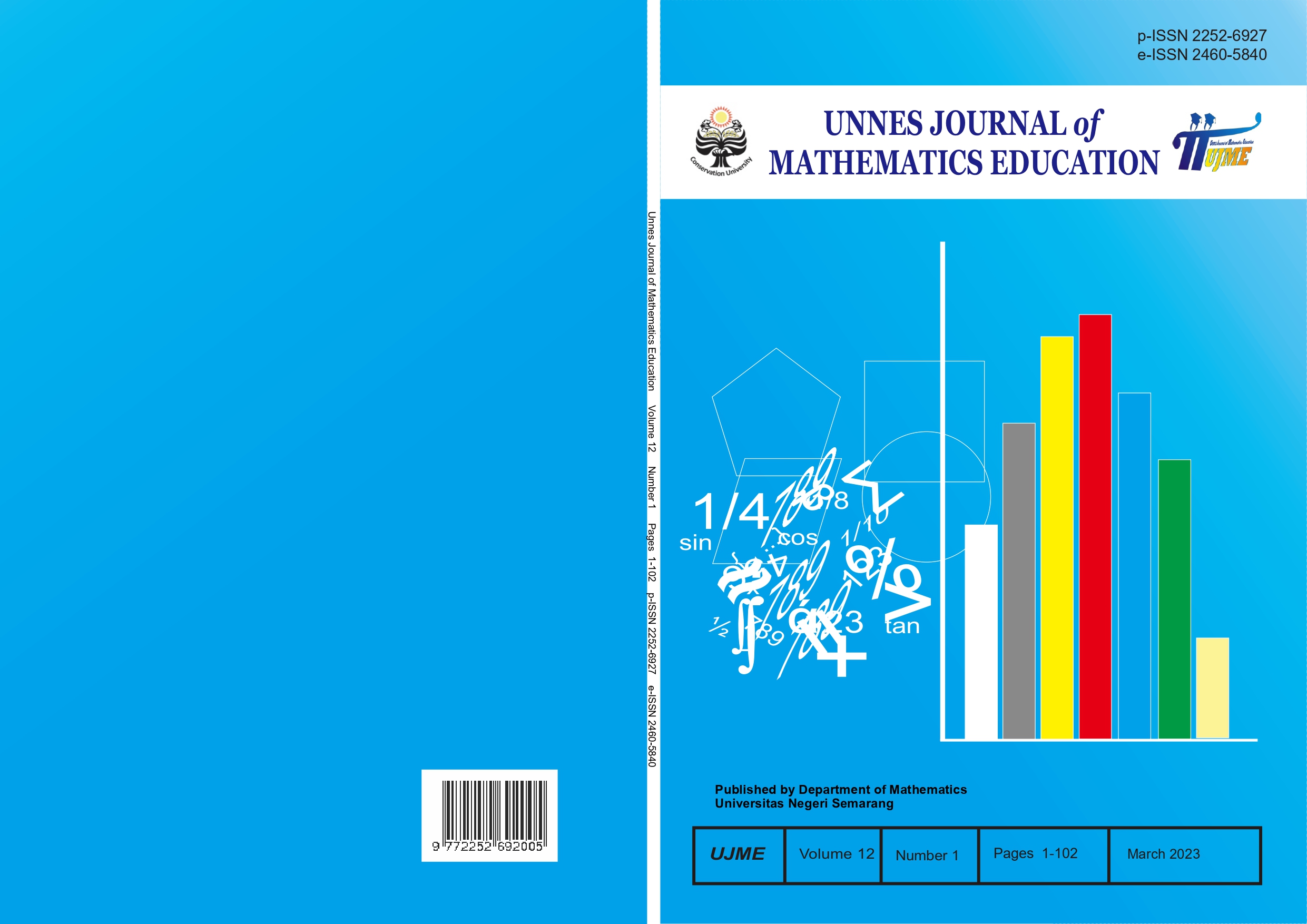Development of Entrepreneurship-Based Mathematical E-Module and Its' Learning with PBL to Improve Students' Mathematical Problem Solving Ability
##plugins.themes.academic_pro.article.main##
Abstract
The purpose of this study was to determine the validity of the entrepreneurship-based mathematics E-Module, the practicality and effectiveness of learning mathematics with the PBL model assisted by the entrepreneurship-based mathematics E-Module to improve students' mathematical problem solving abilities. This research is a development research with the ADDIE model which is applied to class XI of SMK Negeri 1 Lemahabang, Cirebon Regency. The results showed that the entrepreneurship-based mathematics E-Module was declared valid with a percentage of the E-Module value of 92.88% in the "Very Eligible" category. Mathematics learning with the PBL model assisted by the E-Module mathematics based on entrepreneurship is stated to be (1) practical with a percentage of 86.9% of students and 96% of teachers falling into the "Very Practical" category; (2) effective based on the results of the posttest which showed that the experimental class achieved individual learning mastery of 75% with and achieved 75% classical learning completeness compared to the control class which did not achieve individual and classical learning mastery with grades . In addition, through the independent sample t test, it was found that the posttest results of the experimental class were better than the control class.
##plugins.themes.academic_pro.article.details##
References
Aulia, A., Suarman, & Nasir, M. (2020). Implementasi Pembelajaran Kewirausahaan dalam Menumbuhkembangkan Karakter Kewirausahaan pada Siswa di SMK Negeri Pertanian Terpadu Provinsi Riau. Jurnal Manajemen Pendidikan, 4, 1–10.
Hendriana, H., Rohaeti Eti, E., & Sumarmo, U. (2017). Hard skills dan soft skills matematik siswa. Refika Aditama.
Hendriana, H., & Soemarmo, U. (2017). Penilaian Pembelajaran Matematika. PT Refika Aditama.
Islamiah, N., Purwaningsih, W. E., Akbar, P., & Bernard, M. (2018). Analisis Hubungan Kemampuan Pemecahan Masalah Matematis Dan Self Confidence Siswa SMP. Journal On Education, 1(1), 47–57.
Kamin, V. A., Andinny, Y., & ... (2021). Analisis Kemampuan Pemahaman Konsep Matematika Materi Fungsi Komposisi Dan Invers Kelas X. … Pendidikan Matematika, 189–200. http://www.proceeding.unindra.ac.id/index.php/DPNPMunindra/article/view/5550
Mary Olukemi, O., & Ezekiel Gbenga, O. (2015). Relevance of Mathematics Education to Entrepreneurship Skills Acquisition towards the Realization of Vision 20:2020. International Journal for Cross-Disciplinary Subjects in Education, 7(2), 2768–2773. https://doi.org/10.20533/ijcdse.2042.6364.2016.0377
Masduki, L. R., & Kurniasih, E. (2019). Penerapan Pembelajaran Entrepreneur Berbasis Matematika. JIPMat, 4(1), 28–37. https://doi.org/10.26877/jipmat.v4i1.3663
Mayratih, G. E., Leton, S. I., & Uskono, I. V. (2019). Pengaruh Disposisi Matematis Terhadap Kemampuan Pemecahan Masalah Matematis Siswa. Asimtot : Jurnal Kependidikan Matematika, 1(1), 41–49. https://doi.org/10.30822/asimtot.v1i1.97
Nasution, A. (2016). Pengembangan Modul Matematika Berbasis Masalah untuk Meningkatkan Kemampuan Pemecahan Masalah Matematika Siswa. In Jurnal Pendidikan dan Kependidikan (Vol. 1, Issue 1).
Pratiwi, R., & Hidayati, N. (2022). Kemampuan Pemecahan Masalah Matematis Siswa Kelas XI SMK Berdasarkan Tahapan Polya. Jurnal Educatio FKIP UNMA, 8(1), 256–263. https://doi.org/10.31949/educatio.v8i1.1978
Ramadanti, F., Mutaqin, A., & Hendrayana, A. (2021). Pengembangan E-Modul Matematika Berbasis PBL (Problem Based Learning) pada Materi Penyajian Data untuk Siswa SMP. Jurnal Cendekia : Jurnal Pendidikan Matematika, 5(3), 2733–2745. https://doi.org/10.31004/cendekia.v5i3.759
Septyani, R., Salim, A., Rakhmawati, R., & Masykur, R. (2019). Pengembangan Media Pembelajaran Matematika Modul Bilingual Bergambar Berbasis Kewirausahaan Pada Aritmetik Sosial. Journal of Mathematics Education and Science, 2(1), 1–9. https://doi.org/10.32665/james.v2i1.46
Siagian, M. V, Saragih, S., & Sinaga, B. (2019). Development of Learning Materials Based on Realistic Mathematics Education Approach to Improve Students’ Mathematical Problem Solving Ability and Self-Efficacy. International Electronic Journal of Mathematics Education, 14(2), 331–340.
Sukestiyarno, Y. (2021a). Metode Penelitian Pendidikan. Alem Print.
Sukestiyarno, Y. (2021b). Olah Data Deskriptif dan Inferensial (Teori dan Praktek).
Supriatna, H. (2016). Pembentukan Kemampuan Literasi Matematika dan Jiwa Kewirausahaan pada Pembelajaran Matematika Model Problem Based Learning Berpendekatan …. PRISMA, Prosiding Seminar Nasional Matematika, 2014, 203–216. https://journal.unnes.ac.id/sju/index.php/prisma/article/view/21459
Susanti, B., & Lestari, Y. A. P. L. (2019). Menyelesaikan Soal Fungsi Komposisi dan Fungsi. 01(03), 446–459.
Wahyuni, A. (2020). J urnal Pendidikan Matematika. Jurnal Pendidikan Matematika, 11(1), 67–76. http://ojs.uho.ac.id/index.php/jpm
Yuliani, W., & Banjarnahor, N. (2021). Metode Penelitian Pengembangan (Rnd) dalam Bimbingan dan Konseling. Quanta, 5. https://doi.org/10.22460/q.v2i1p21-30.642
